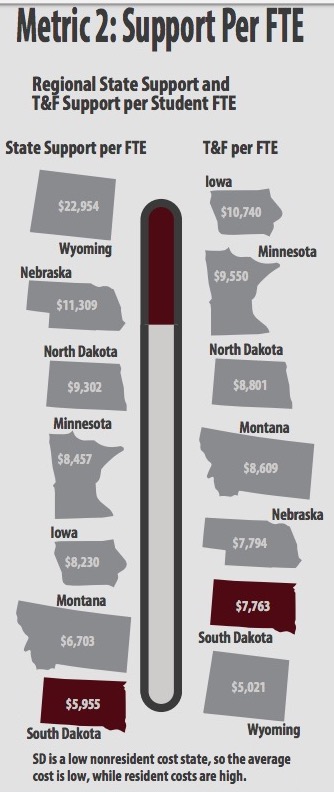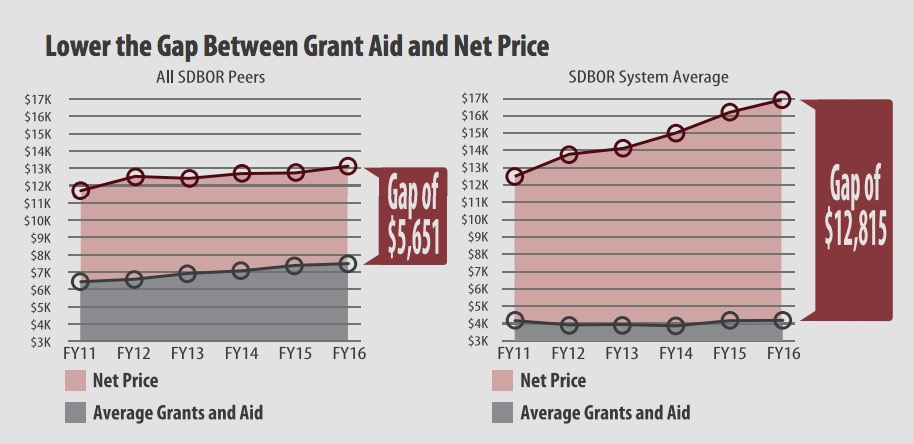New Board of Regents exec Paul Beran sounds like he’s ready to acquiesce to our cheapskate Legislature and keep the burden for funding higher ed in South Dakota on students and other funding sources:
Conlon: As the new CEO, how will you work to help keep the cost of college affordable?
Beran: It’s a combination of working with the legislation in terms of funding for higher education. I keep going back to this efficiency piece, but it’s making sure we are as efficient as we possibly can, so there’s a return on investment.
When the state invests money into higher education, they’re going to get a high return on their investment. You can’t expect a bottomless well of support, so it’s up to the universities to look for ways to be efficient — to raise private dollars, to increase grant production — all those things to increase opportunities for resources to come into the state [Paul B. Beran, interviewed by Shelly Conlon, “New Board of Regents CEO: Efficiency Is Key to Bringing Back Affordable Tuition,” that Sioux Falls paper, 2018.07.27].
South Dakota provides less state support per university student FTE than any neighboring state…

…but Beran seems ready to sigh and say the universities need to squeeze more peanut butter from the Legislature’s peanuts:
The focuses are what the board has directed me to do as well, and we obviously need to retain students and graduate students. But we also need to make sure we are as efficient as an organization as possible. The more efficient we are, the more we’re able to maintain and keep tuition as low as possible, so people can afford to go to school.
The biggest impediment to completing a degree is really money, and also to look for efficiencies in terms of how fast we can get people to graduate, how we can move them forward the system as quickly as possible. That also can be an impediment as well [Beran, in Conlon, 2017.07.24].
Now the Regents may well find new efficiencies, like closing their overbuilt and underserving university centers. But the universities could also encourage their wealthy donors, who with seeming glee pour their money into non-academic, non-degree-producing projects like stadia and practice fields, to save some of their money and encourage the Legislature to tax that wealth so the state can bring its share of higher ed funding back above 50%, the way it was a mere eleven years ago:

The Regents could also push the Legislature to end South Dakota’s embarrassing status as the only state not offering needs-based scholarships. Such state assistance would help lower the high and growing gap between the net price of a university education and average grants and aid, a gap that our neighboring states have managed to keep from growing in the last few years:

Let’s hope Beran’s opening statements are just the caution of a nice guy not wanting to upset the powers that be on his first day on the job… and perhaps waiting to see if he’s going to be working with a Governor Billie Sutton, who recognizes the value of higher education, or a Governor Kristi Noem, who counts on keeping the electorate under-educated and over-indebted so they don’t notice how unqualified she is for her job. But whoever takes charge of the executive branch, by the time we get to Session, the Regents need to send their exec to the Capitol to make the case that the state must get back to bearing its share of the investment in our Regental system.
Related: Beran says his goals are to retain and graduate students, keep them in South Dakota, and make them into taxpayers. No word in those priorities about creating good citizens, educated voters, or self-actualizing lifelong learners. Sigh.
Are you aware how much money the BOR has in reserves? Are you aware
of the astronomically high amount of monies specially appropriated every year in numerous spending bills? Evidently not. The answer is not the go to liberal solution of taking more of hard working South Dakota taxpayers’ monies and giving billions more to the BOR. The answer is hold them accountable for the monies they get now and the education results of the students.
How much monies do you donate to the colleges since you complain they need more money? If they were actually in dire straights, you would know these answers and you surely would be taking huge percentages of your own family finances to donate. Since both are a negative, it makes this hollow rhetoric.
No, this “donate” thing is bunk. Public universities are a vital public function. Skinflint Republicans don’t get to shut down debate on increasing public funding by deriding advocates for not funding it out of their private pockets. That’s exactly the privatization paradigm the GOP wants and which is deeply flawed, irresponsible, and undemocratic. Universities should not have to seek private funding. Higher education is important enough that we should be able to make enough public money available for students to attend and get degrees without ending up in big debt. That’s not hollow rhetoric; that’s commitment to our public responsibilities which I would bring to the Senate to combat certain Republican Senators’ skinflintery.
For the job market of the 21st century to meet the nation’s needs, we need better educated, better thinking employees, not less. The drive to make 4 years of college tuition and fee free is critical to maintaining US supremacy ahead of hard charging China.
The US has enough money to make that happen. The problem is that so much of it is hoarded by the wealthiest citizens. A real tax reform requiring them to pay their fair share will solve the problem.
Throughout the history of the US a solid, progressive income tax has been good for the nation’s entire economy.
@CAH So you have no idea what the BOR has in its accounts all ready nor how much special appropriations they received this year alone, yet you are sure the problem is that not enough money is being thrown at them. What percentage of the average South Dakotans’ salary should be taken from them to satisfy your idea that they are not spending enough of their money on someone else’s education? If you truly thought the BOR was destitute, and desperately needs more money, why should we not expect you to donate YOUR family finances? An account for such purposes was set up for just such purposes. Maybe not all South Dakotans have as much free cash laying around to pay for someone else’s education. I have a new granddaughter who I prefer to set money aside for, you are free to pay for some kid from MN’s free education. Yes, please.. tell my constituents that I am a skinflint and opposed to you and the other tax and spenders ideas of taking more money from South Dakotans for “free college.”
http://sdlegislature.gov/docs/interim/2018/documents/goa4-24-18borcashbalancesdoc5a.pdf
Here’s what each of the state universities has in their accounts, as reviewed by Government Operations and Audit Committee at their April meeting, (membership of which Sen. Nelson forfeited this year). It was reviewed in detail by GOAC and also the Appropriations Committee. You could listen to what those committee members listened to here: http://sdpb.sd.gov/SDPBPodcast/2018/Interim/GOA04242018.mp3
Some might ignore this information, or say it’s too complicated to understand, or that they don’t believe the information presented. Many also misjudge the materiality of one million dollars. (I.e., amount of dollars of reserves needed to run multi-million dollar operations). Is $1million a lot of money? Absolutely. Is it a lot compared to the vagaries of a large university’s exposure to enrollment fluctuations and other costs that can spiral out of control (utilities, fuel costs)? Not so much. The operating cash researves of each university is close to 10%, the same goal that we have for the state general fund reserve.
Sometimes bureaucrats do tend to gloss over things, or omit information they don’t want us to know. In this case, because of our state’s relative funding position to other states’ support levels, I believe them. I know from years of experience what sacrifices we are asking of our very own children in dealing with less than optimum learning environments, to say nothing of the high level of average student loan debt our students carry. (Do a case study of how many legislators’ children/grandchildren attend either out-of-state or private K-12 and higher educational institutions. Wonder why?)
Yes, public education is a vital PUBLIC function. It is critical to the functioning of a democracy and to the competitive position of a state. Anyone who is a serious student of SD state government knows that we run this state on a shoestring compared to other states, and that we are as efficient as any geographically large, rural state. The GOP has perpetrated a 40 year hoax on SD citizens. As I mentioned in my budget remarks last March, we are not a poor state. We are just choosing not to compete for our future, for the privilege of bragging about our “#1 business friendly state.” Note you don’t hear nearly as much about where we rank in the fairness of our tax system, the well-being of our care providers, our work force safety, our kids, our education systems, and certainly not the health of our citizens. That’s because we don’t rank so well there.
I love it when numbers crush rhetoric. It’s always easy to shout efficiency, but that ignores the shoestring reality that Rep. Wismer explains with data. Under normal operations, those reserves would be gone in less time than the Legislature spends in Pierre. The spending Senator Nelson calls “astronomical” doesn’t even get us out of the troposphere, leaving students to foot more of the bill than they had to just eleven years ago and pushing more of them, including, as Rep. Wismer points out, many legislators’ kids, to seek their education elsewhere, in cultures that place a higher value on education.
So gratifying to hear from our formidable Rep. Wismer. Should Billie Randy Tim and the Fredericks pull this off and win some constitutional seats, SD will begin years of progress with those Dems already in office. We MUST VOTE OVERWHELMINLY Democratic this year!
G :)
Susan,
We run it on a shoe string because South Dakota citizens know how to spend their money better than the State Government.
Cliché and rot, Jason. How South Dakotans spend their after-tax dollars has nothing to do with maintaining affordable public universities and other educational opportunities. Rep. Wismer is right: your nonsense inly facilitates the idea that it’s more important that you be able to buy a second jet-ski than that we as a community invest in the future.